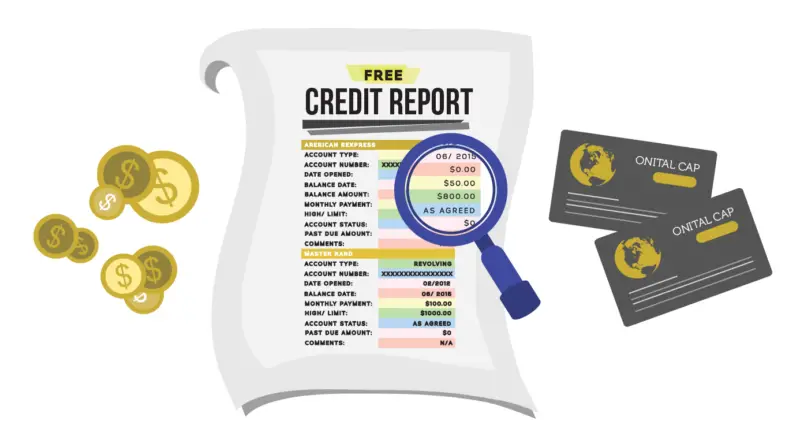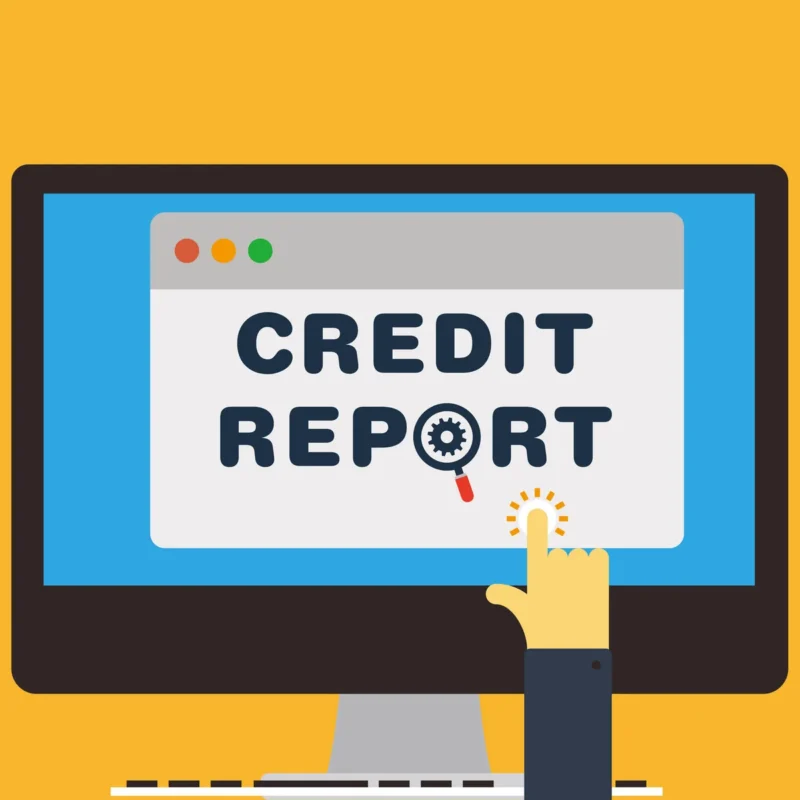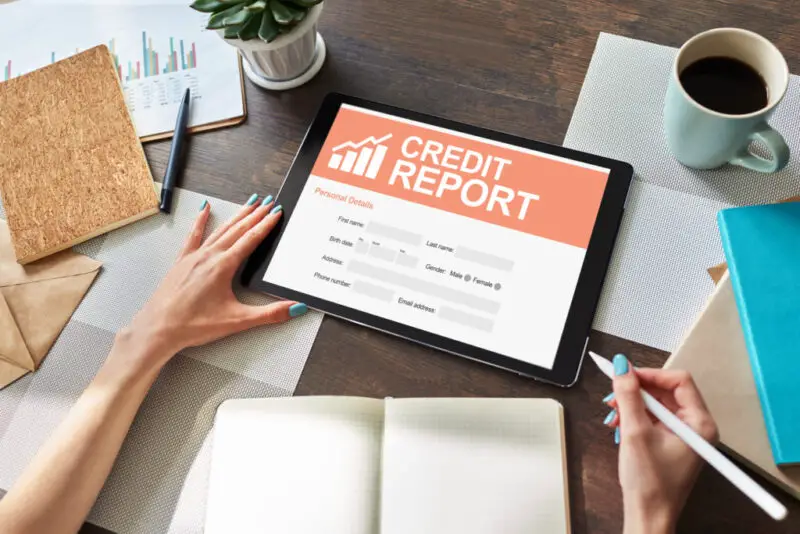In today’s fast-paced world, maintaining a solid credit standing is crucial for achieving financial success. Your credit report serves as a window into your financial history, providing lenders, landlords, and employers with valuable insights about your creditworthiness. But did you know that you can access your credit report online for free? In this article, we will explore the importance of credit reports, delve into the convenience of free online credit reports, and uncover the myriad benefits they offer.
Mục lục

A. Importance of Credit Reports
Imagine embarking on a journey without a roadmap. Sounds daunting, doesn’t it? Similarly, navigating the realm of credit and finances without a credit report is like wandering aimlessly in a financial wilderness. Credit reports provide a comprehensive overview of your credit history, including your payment history, outstanding debts, and credit utilization. This invaluable document dictates your eligibility for loans, credit cards, and even rental agreements. Lenders rely on credit reports to assess your financial reliability, determining the interest rates and terms they offer you. Therefore, understanding and monitoring your credit report is paramount to securing favorable financial opportunities.
B. Overview of Free Online Credit Reports
Gone are the days of waiting for snail mail to deliver your credit report. With the advent of technology, accessing your credit report has never been easier. Free online credit report services empower you to effortlessly view and analyze your credit standing at your convenience. These platforms compile data from major credit bureaus, such as Experian, Equifax, and TransUnion, to provide a comprehensive snapshot of your financial health. By simply entering a few details, you can gain immediate access to your credit report, saving you time and hassle.
C. Benefits of Accessing Credit Reports Online
- Convenience at Your Fingertips: Online credit reports allow you to access your financial information from the comfort of your own home, at any time. No longer do you need to schedule appointments or spend hours on hold with customer service representatives. With just a few clicks, you can unlock the secrets of your credit report whenever and wherever you please.
- Early Detection of Errors: Credit report errors are more common than you might think. By regularly checking your credit report online, you can quickly identify any inaccuracies or fraudulent activities that may be negatively impacting your credit score. Timely detection allows you to rectify these issues promptly, safeguarding your financial reputation.
- Improved Financial Planning: Accessing your credit report online provides you with a clear understanding of your financial standing. Armed with this knowledge, you can strategize and plan for a better financial future. Whether you’re aiming to pay off debts or boost your credit score, online credit reports offer valuable insights to help you chart your path towards financial success.
Stay tuned as we delve deeper into the world of credit reports, exploring the components of a credit report and the steps to access your free credit report online. Let’s unlock the doors to financial freedom together!
Understanding Credit Reports

A. Definition and Purpose of Credit Reports
Credit reports serve as a comprehensive record of an individual’s credit history. They provide a detailed account of financial activities, such as loans, credit card payments, and outstanding debts. The purpose of credit reports is to assess an individual’s creditworthiness and determine their ability to manage financial obligations. Lenders, landlords, and even potential employers rely on credit reports to make informed decisions about granting credit, renting properties, or offering employment opportunities.
B. Components of a Credit Report
A credit report consists of various sections that collectively paint a picture of an individual’s creditworthiness. These sections include:
- Personal Information: This section includes your name, address, social security number, and employment history. It helps verify your identity and ensure accuracy in the report.
- Credit Accounts: This section lists all your credit accounts, such as credit cards, mortgages, and personal loans. It provides details about the account’s opening date, credit limit, current balance, and payment history.
- Payment History: The payment history section showcases your track record in meeting financial obligations. It highlights whether payments were made on time, late, or if there were any defaults or collections.
- Credit Inquiries: This section displays a list of entities that have requested your credit report. It differentiates between “hard” inquiries (resulting from credit applications) and “soft” inquiries (resulting from background checks or pre-approvals).
- Public Records: Any public records associated with your financial history, such as bankruptcies, tax liens, or court judgments, are included in this section. These records can significantly impact your creditworthiness.
C. How Credit Reports Impact Financial Health
Credit reports play a pivotal role in determining an individual’s financial health. A positive credit report, showcasing timely payments and responsible credit utilization, reflects a strong financial standing. This can lead to favorable interest rates, increased borrowing capacity, and improved access to financial opportunities. Conversely, a negative credit report, marred by late payments, high debts, or derogatory marks, can hinder one’s ability to secure loans, obtain affordable insurance rates, or even land a job. Understanding the impact of credit reports on financial health is vital for maintaining a solid credit standing.
D. Factors Affecting Credit Scores
Credit scores are numerical representations of an individual’s creditworthiness. While credit reports provide the raw data, credit scores condense this information into a single number. Several factors influence credit scores, including:
- Payment History: The timeliness of your payments and any history of missed or late payments.
- Credit Utilization: The ratio of your credit card balances to your credit limits. Higher utilization can negatively impact your credit score.
- Length of Credit History: The length of time you have been using credit. A longer credit history generally indicates stability and can positively impact your credit score.
- Credit Mix: The variety of credit types, such as credit cards, loans, or mortgages, in your credit report. A healthy mix can positively influence your credit score.
- New Credit: The number of recent credit applications and inquiries. Multiple new credit applications within a short period can raise concerns and potentially lower your credit score.
Understanding the components of credit reports and the factors affecting credit scores is essential for navigating the world of credit and finance. In the next section, we will explore the convenience and features of free online credit report services, empowering you to take control of your financial journey.
Free Online Credit Report Services

In this digital era, numerous platforms have emerged, offering free online credit reports to individuals seeking a clearer understanding of their financial standing. Let’s explore the top platforms that provide this valuable service, along with the features, benefits, and necessary steps to access your free credit report online.
A. Top Platforms Offering Free Credit Reports Online
- Credit Karma: Renowned for its user-friendly interface and extensive credit monitoring tools, Credit Karma offers free access to credit reports from TransUnion and EquifaWith personalized recommendations and credit score simulations, Credit Karma equips users with the knowledge to make informed financial decisions.
- AnnualCreditReport.com: As the only government-authorized website for free credit reports, AnnualCreditReport.com provides individuals with access to their credit reports from all three major credit bureaus – Equifax, Experian, and TransUnion. This platform ensures accuracy and reliability, offering consumers unparalleled peace of mind.
- Credit Sesame: With its intuitive credit monitoring features and personalized financial insights, Credit Sesame enables users to monitor their credit reports and scores effortlessly. Alongside free credit reports, Credit Sesame provides identity theft protection and personalized recommendations for credit improvement.
B. Features and Benefits of Using Free Credit Report Services
- Comprehensive Credit Information: Free credit report services offer a detailed overview of your credit history, including information on open accounts, payment history, and outstanding debts. This comprehensive snapshot allows you to identify areas of improvement and take proactive steps towards a healthier credit profile.
- Credit Score Monitoring: Many platforms provide users with real-time credit score updates and alerts. By keeping a close eye on your credit score, you can track its fluctuations and address any sudden changes promptly. This monitoring feature is essential for maintaining financial stability and preventing identity theft.
- Financial Education and Insights: Free credit report services often provide educational resources and personalized insights to help users better understand their credit reports. You can gain valuable knowledge about credit management, debt reduction strategies, and credit-building techniques, empowering you to make informed financial decisions.
C. Steps to Access Free Credit Reports Online
- Visit the website of the chosen platform offering free credit reports.
- Create an account by providing the necessary personal information.
- Verify your identity through a secure authentication process.
- Once authenticated, navigate to the credit report section on the platform.
- Review and analyze the information presented on your credit report.
- Take note of any discrepancies or errors that may require further action.
D. Security Measures to Protect Personal Information
While accessing your credit report online offers convenience, it is crucial to prioritize the security of your personal information. When utilizing free credit report services, ensure that the platform employs robust security measures, such as encryption, multi-factor authentication, and secure data storage. Additionally, be cautious of phishing attempts and only provide your information on trusted and reputable platforms.
Now that we have explored the top platforms, features, and steps to access free credit reports online, let’s move forward and delve into the intricacies of interpreting credit reports in the upcoming section. Stay tuned!
Interpreting Credit Reports

Understanding the intricacies of your credit report is vital in taking control of your financial future. In this section, we will explore how to interpret credit reports, identify errors or inaccuracies, and leverage the insights gained to improve your credit score.
A. Reading and Understanding Credit Report Sections
Credit reports may seem overwhelming at first glance, but breaking them down into sections can make them more manageable. Each section of a credit report provides valuable information about different aspects of your credit history. Common sections include:
- Personal Information: This section contains your name, address, social security number, and other identifying details. Ensure that all information is accurate and up to date.
- Account Information: Here, you will find a list of your credit accounts, including credit cards, loans, and mortgages. It outlines the type of account, the date it was opened, the credit limit or loan amount, and the payment history.
- Payment History: This section reflects your payment behavior, indicating whether you have made payments on time or have had any delinquencies or defaults. Timely payments positively impact your credit score, while late or missed payments can have a negative effect.
- Credit Utilization: This metric reveals how much of your available credit you are currently using. Aim to keep your credit utilization ratio below 30% to demonstrate responsible credit management.
B. Identifying Errors or Inaccuracies in Credit Reports
While credit bureaus strive for accuracy, errors can still occur on credit reports. Identifying and rectifying these errors is crucial to ensure an accurate representation of your creditworthiness. Common errors include:
- Inaccurate Personal Information: Check that your name, address, and other personal details are correct. A misspelled name or outdated address can lead to confusion and potential credit mix-ups.
- Incorrect Payment History: Review your payment history carefully for any discrepancies. Look out for late payments erroneously marked as delinquent or accounts that don’t belong to you.
- Duplicate Accounts: Ensure that your credit report doesn’t list duplicate accounts, as this can inflate your debt and negatively impact your credit score.
C. How to Dispute Errors on Credit Reports
If you spot any errors or inaccuracies on your credit report, take immediate action to dispute them. Follow these steps to initiate the dispute process:
- Gather Documentation: Collect evidence supporting your claim, such as payment receipts, account statements, or any correspondence with the creditor.
- Contact the Credit Bureau: Reach out to the credit bureau that issued the report containing the error. Provide a clear and concise explanation of the error and include any supporting documentation.
- Inform the Creditor: Notify the creditor associated with the erroneous information about the discrepancy. They are responsible for investigating and rectifying the error.
D. Improving Credit Scores Based on Credit Report Analysis
Analyzing your credit report can unlock insights to improve your credit score. By understanding areas of improvement, you can take strategic steps to boost your creditworthiness. Consider the following actions:
- Pay Bills on Time: Late payments significantly impact your credit score. Set reminders or automate payments to ensure you never miss a due date.
- Reduce Credit Utilization: Aim to keep your credit utilization ratio below 30%. Pay off outstanding balances or request credit limit increases to achieve a healthier ratio.
- Address Outstanding Debts: Prioritize paying off high-interest debts. By reducing your overall debt burden, you demonstrate responsible financial management.
- Monitor Credit Report Regularly: Regularly review your credit report to track your progress and identify areas that require attention. Address any errors promptly to prevent long-term consequences.
Understanding how to interpret credit reports, identify errors, and leverage the insights gained can empower you to take control of your financial well-being. Let’s move forward and explore additional resources and services that can enhance your credit report journey.
Additional Credit Report Resources

In our quest to master the art of credit reports, we have explored the basics of accessing free online credit reports. However, there are additional resources that can further enhance your credit management journey. Let’s dive into these valuable tools and services that can provide comprehensive monitoring, advanced features, educational resources, and credit improvement assistance.
A. Credit Monitoring Services for Comprehensive Monitoring
Just as a vigilant guardian watches over their domain, credit monitoring services keep a watchful eye on your credit health round the clock. These services provide real-time alerts and notifications whenever there are changes to your credit report, such as new accounts, inquiries, or suspicious activities. With comprehensive monitoring, you can detect potential fraud or identity theft early on, giving you the upper hand in protecting your financial well-being. By subscribing to a credit monitoring service, you gain peace of mind knowing that your credit is under constant surveillance.
B. Paid Credit Report Options for Advanced Features
While free credit reports offer valuable insights, there are occasions where you may require additional features and a more in-depth analysis of your credit history. Paid credit report options provide advanced features, such as credit score tracking, credit score simulators, and personalized recommendations for credit improvement. These services delve deeper into the nuances of your credit report, offering a comprehensive understanding of the factors influencing your creditworthiness. If you’re serious about optimizing your credit standing, investing in a paid credit report can provide valuable insights and tools to help you achieve your financial goals.
C. Educational Resources for Credit Report Understanding
Knowledge is power, and when it comes to credit reports, understanding the intricacies of the information presented is vital. Educational resources dedicated to credit report understanding can equip you with the knowledge necessary to navigate your credit journey with confidence. Online guides, articles, and tutorials break down the components of credit reports, explain how credit scores are calculated, and provide tips on improving your creditworthiness. By immersing yourself in these educational resources, you can become an informed consumer, making wise financial decisions based on a solid understanding of credit reports.
D. Credit Counseling Services for Credit Improvement
Sometimes, despite our best efforts, our credit health may require professional guidance. Credit counseling services offer personalized assistance in improving your credit standing. These experts analyze your credit report, identify areas for improvement, and develop a tailored plan to help you achieve your financial goals. With their expertise, you can navigate the complexities of credit repair, debt management, and financial planning. Credit counseling services provide the support you need to regain control of your credit and steer towards a brighter financial future.
As we conclude this exploration of credit report resources, remember that knowledge is the key to unlocking your financial potential. Whether you opt for credit monitoring services, paid credit reports, educational resources, or credit counseling services, each resource offers unique benefits to help you make informed decisions and achieve your desired credit goals.
Conclusion

In conclusion, accessing your free credit report online is an essential step towards achieving financial well-being. Understanding the importance of credit reports and the convenience they offer can empower you to take control of your financial future.
By regularly monitoring your credit report, you can identify and rectify errors, ensuring that your credit score accurately reflects your financial behavior. This proactive approach allows you to address any issues promptly, protecting your creditworthiness and opening doors to better financial opportunities.
At erp.ebest.vn, we understand the significance of free online credit reports in shaping your financial journey. We encourage you to take advantage of the convenience and accessibility these services provide. By utilizing the top platforms that offer free credit reports online, you can stay informed about your credit standing and make informed financial decisions.
Remember, your credit report is not just a piece of paper; it is a key that unlocks financial freedom. By leveraging the insights gained from your credit report, you can improve your credit score, secure favorable interest rates, and achieve your financial goals.